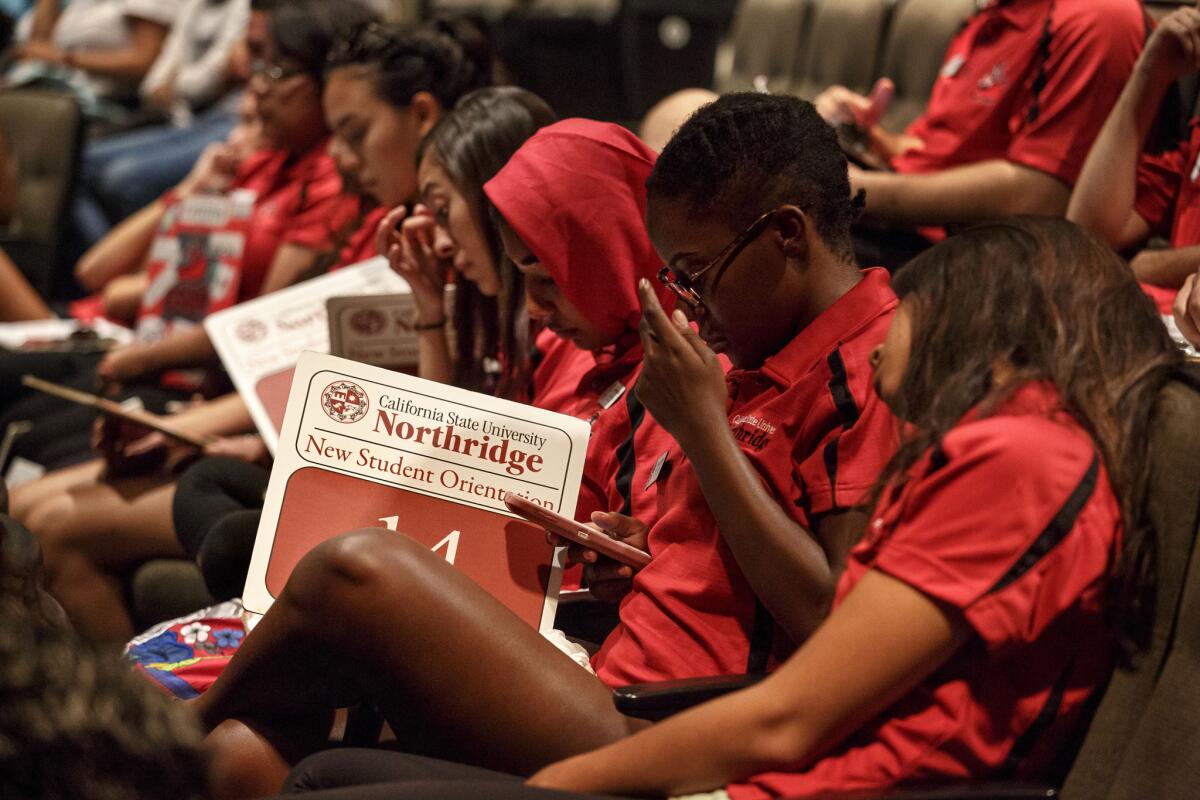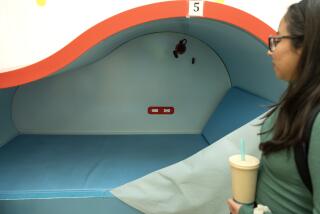What colleges are doing to address students’ unprecedented levels of stress

At freshman orientation at Cal State Northridge in August, students got information about the new wellness center, which offers acupuncture, massage therapy and drop-in yoga.
Ye Seong Kim’s freshman year at UCLA was so stressful that she considered dropping out and attending a community college until she was better prepared.
“After struggling and studying so hard, it seemed like it wasn’t paying off and I wasn’t getting the grades,” said Kim, 21. “I wasn’t enjoying the subjects and I was thinking maybe this isn’t what I want. It made me wonder why I was here.”
The biochemistry major overcame those anxieties and has entered her fourth year at the Westwood campus. But the questions she hears now as an advisor for new students resonate deeply: Will I be homesick? How will I make new friends? What if I ask a dumb question in class?
Those fear-inducing uncertainties are why UCLA and colleges and universities around the country increasingly look to boost not just academics, but the mind, body and soul of students who report unprecedented levels of stress and depression.
A report last year by the Center for Collegiate Mental Health at Penn State showed that rates of self-harm and suicidal thoughts have increased among students seeking mental health services at colleges. One out of three have seriously considered suicide and one out of 10 have made a suicide attempt, according to the report. Almost half of the students reported that academic performance was a main cause of mental distress.
Information about mental health and counseling is a focus at many new student orientations and more faculty and staff are being trained to identify students in crisis.
Beyond professional counseling, colleges increasingly are adding amenities to lift spirits.
At UCLA, specially designed nap pods are positioned around campus, students can sign up for the happiness challenge — sleeping well, performing a good deed, among other things, for a week at least — and organic vegetables, lean proteins and whole grains dominate the menu at its popular new health-themed dining hall. Cal State Northridge opened a new wellness center this fall, offering acupuncture, massage therapy and drop-in yoga.
USC recently launched a university-wide effort to encourage meditation and a more contemplative campus community aimed at reducing stress and improving concentration in the classroom.
First-year students, facing one of the biggest transitions of their lives, are especially at risk for emotional and physical strains, health experts say. But, they add, the “Freshman 15” weight gain is more myth than reality.
“What science reveals is that the average college student may gain somewhere from two or three pounds in the first year, but I’ve had students who actually gain 30 to 40 pounds; it’s all over the map,” said Ellen Bauersfeld, a dietitian at the Northridge student health center. “Why? They’re in a completely new environment and for some of our students, it’s the first time on their own, with nobody helping them to prepare meals, nobody guiding them, no limits.’
There are mixed signs about students’ mental health. On the one hand, students enrolling in four-year colleges and universities had the lowest self-reported rates of alcohol and tobacco use in more than 30 years, according to an annual survey of more than 153,000 freshmen by UCLA’s Higher Education Research Institute.
On the other hand, only about half of incoming freshmen reported a high level of emotional health, the lowest rate ever, while the number of students who said they were frequently depressed rose from 6% in 2009 to 9.5%. Research suggests that emotionally fragile students are more discontented with college and struggle to feel like they belong.
Counseling centers are reporting record numbers of visits and more students with disabilities and chronic illness, the report said. But cuts in student service budgets hamper efforts at many public universities in California and elsewhere to deal with the influx.
Nonetheless, colleges have taken on more responsibility for all aspects of students’ lives, said Greg Eells, director of counseling and psychological services at Cornell University.
“In the last 10 or 15 years, there has been more emphasis on outreach and taking on a public policy health approach,” said Eells, past chairman of mental health at the American College Health Assn. “Colleges are doing more prevention, promoting resilience, coping skills and teaching young people how to manage.”
That may be why “mindfulness” is the new catchword on many college campuses, said Varun Soni, dean of religious life at USC, which last year launched a program that includes free meditation courses, training faculty in the use of more reflective teaching techniques to help students focus attention on the present moment, and research, funded by federal and private grants, studying the impact of such methods on insomnia, substance abuse, anxiety and other ills.
Some critics say the benefits of the practice are overstated and that practitioners lack training. Those leading mindfulness classes at USC are professional, certified instructors, Soni said.
Last year, classes filled up quickly with hundreds of students, faculty and staff on waiting lists.
“We are aggressively secular, focused on learning and healthy outcomes and emotional intelligence,” Soni said. “In college, there’s a lot of emphasis placed on one’s IQ but less on one’s EQ, meaning purposefulness, happiness and success.”
At Caltech, classes in the first two terms are offered on a pass/fail basis — a more practical relief for anxious freshmen, said Barbara Green, interim dean of undergraduate students.
“All of them are really brilliant obviously, but it’s not easy for everybody to realize they can’t all be in the top half,” Green said. “We encourage collaboration rather than a competitive approach. For most freshmen, they’re just happy to be with people who share their interest in math and science.”
Finding your interest inside and outside of the classroom is key to successfully negotiating the rocky first year, said Kim. She said she initially suffered from trying to meet what she thought were her parents’ expectations, only to discover that they wanted her to follow her own path. Her stress level diminished and she enjoyed a more active social life.
“I let students know that no one student is the same and whether it’s time management or getting enough sleep, what works for one person, may not work for another,” she said. “College is all about finding out what works for you.”
Twitter: @carlariveralat
More to Read
Start your day right
Sign up for Essential California for news, features and recommendations from the L.A. Times and beyond in your inbox six days a week.
You may occasionally receive promotional content from the Los Angeles Times.







